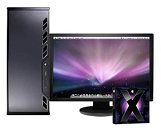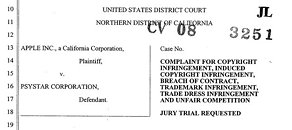Friday, September 30th 2011

Apple Emerges Victorious Against Psystar, But Have They Really Triumphed? (UPDATED)
In a court ruling on Wednesday 28th September 2011, Apple's assertion that any kind of 'Hackintosh' was, is and always will be, illegal, was conclusively affirmed. This will bring great dismay to Psystar customers, potential purchasers of other "alternative Macs" and the many PC enthusiasts who want to run the latest Apple OS on the high-spec rigs they've built themselves from hand-picked components. This ruling has unfortunately sounded the death knell for enterprising and surprisingly plucky upstart outfit, Psystar, who showed what could be possible with an open mind and technical skill. UPDATE after the jump.Psystar began selling their Mac OS X-capable Open Computer in April 2008, despite the fact that they unequivocally broke Apple's licensing restrictions. The EULA read:
In short, the case had more twists and turns than a whodunit novel, with Psystar actually winning a couple of small victories, although it was all ultimately for nothing. Psystar even filed for bankruptcy and just when it looked like it was all over, emerged phoenix-like from the ashes to continue fighting Apple. A surprising accomplishment in the face of such a powerful and relentless legal onslaught.
However, this Wednesday, Apple finally got the hands-down victory they had fought for so long, when judge Mary Schroeder of the US District Court of Appeals of the Ninth Circuit in San Francisco issued the final words in this case:
So there still remains the small matter of whether Apple will be able to keep select court documents sealed, which may cause a smile or two among Psystar supporters. Of course, the damages that Psystar is now liable for are going to completely sink what's left of the company. It's doubtful that Apple will actually see all the money that they're owed and likely that they won't care. It was all about stopping the competition.So, are Apple triumphant in all this? Yes, they have been able to put the genie back in the bottle, they want to protect the 'purity' of their Apple Mac brand and keep any and all profits from the brand, which they have achieved. However, the bottom line is will this actually result in more money flowing into their bank account? It may not.
Think of the original IBM PC: it was cloned, against IBM's wishes and due to a legal technicality, they couldn't stop it. However, this made the platform grow phenomenally into the industry-dominating juggernaut that it is today, together with all the niche spin-offs, including the high performance enthusiast segment. And critically, it has made IBM's product much more successful and lucrative for them than if IBM had been allowed to keep it closed and proprietary with high prices.
So, by the same token, keeping the Mac platform closed and proprietary, Apple are likely to actually reduce awareness and interest in their products. Therefore, ironically, Apple's victory in court may actually be a bigger victory for those in the Anti-Apple camp, who want to see their market penetration remain small and who would be happy if they just faded away into obscurity. So, will Apple's current stance remain now that Steve Jobs has stepped down as CEO and no longer has such a dominating influence over the company? This remains to be seen.
By restricting their products this way, Apple have actually reduced the market penetration of their much-loved operating system, since running it on more and cheaper hardware configurations is no longer possible. Many people that like the Mac OS would normally never buy a Mac due to the sheer cost of entry to the club, which this would have lowered. In time, those same customers may well want the 'real thing' for their next machine and buy a genuine Mac. There's no reason why Apple couldn't have licensed the OS for Psystar hardware and collected a handsome royalty on every sale in the process - a win-win situation.
For more details and lots of links, head on over to The Register article this story was based on.
UPDATE
Well, it looks like this really isn't over yet. Psystar are down, but they are not completely out and are most certainly not giving up. They believe that they have a very strong case, so will be taking it all the way to the Supreme Court.
If Psystar eventually prevail, then it could mean the end of unreasonably restrictive product lockdowns by manufacturers. Read all about it over at update source, PC World.
Source:
The Register
You agree not to install, use or run the Apple Software on any non-Apple-labelled computer, or to enable others to do so.For a surprisingly long time, Apple did nothing. This caused some industry pundits to suggest that perhaps Apple had given their tacit approval for a clone. However, it turned out that this was most certainly not the case and Apple eventually sued Psystar. However, what surprised many, is that Psystar quickly countersued, asserting that Apple's EULA violated the Sherman and Clayton antitrust acts.
In short, the case had more twists and turns than a whodunit novel, with Psystar actually winning a couple of small victories, although it was all ultimately for nothing. Psystar even filed for bankruptcy and just when it looked like it was all over, emerged phoenix-like from the ashes to continue fighting Apple. A surprising accomplishment in the face of such a powerful and relentless legal onslaught.
However, this Wednesday, Apple finally got the hands-down victory they had fought for so long, when judge Mary Schroeder of the US District Court of Appeals of the Ninth Circuit in San Francisco issued the final words in this case:
The district court's grant of summary judgement in favour of Apple and its entry of a permanent injunction against Psystar's infringement of Mac OS X are affirmed.But even in defeat, Psystar won a tiny victory. Apple - in its eternal quest to protect any and all information about itself - had asked Schroeder to keep documents about the summary judgement case sealed. Schroeder refused, saying that to do so "without explanation" was out of bounds.
So there still remains the small matter of whether Apple will be able to keep select court documents sealed, which may cause a smile or two among Psystar supporters. Of course, the damages that Psystar is now liable for are going to completely sink what's left of the company. It's doubtful that Apple will actually see all the money that they're owed and likely that they won't care. It was all about stopping the competition.So, are Apple triumphant in all this? Yes, they have been able to put the genie back in the bottle, they want to protect the 'purity' of their Apple Mac brand and keep any and all profits from the brand, which they have achieved. However, the bottom line is will this actually result in more money flowing into their bank account? It may not.
Think of the original IBM PC: it was cloned, against IBM's wishes and due to a legal technicality, they couldn't stop it. However, this made the platform grow phenomenally into the industry-dominating juggernaut that it is today, together with all the niche spin-offs, including the high performance enthusiast segment. And critically, it has made IBM's product much more successful and lucrative for them than if IBM had been allowed to keep it closed and proprietary with high prices.
So, by the same token, keeping the Mac platform closed and proprietary, Apple are likely to actually reduce awareness and interest in their products. Therefore, ironically, Apple's victory in court may actually be a bigger victory for those in the Anti-Apple camp, who want to see their market penetration remain small and who would be happy if they just faded away into obscurity. So, will Apple's current stance remain now that Steve Jobs has stepped down as CEO and no longer has such a dominating influence over the company? This remains to be seen.
By restricting their products this way, Apple have actually reduced the market penetration of their much-loved operating system, since running it on more and cheaper hardware configurations is no longer possible. Many people that like the Mac OS would normally never buy a Mac due to the sheer cost of entry to the club, which this would have lowered. In time, those same customers may well want the 'real thing' for their next machine and buy a genuine Mac. There's no reason why Apple couldn't have licensed the OS for Psystar hardware and collected a handsome royalty on every sale in the process - a win-win situation.
For more details and lots of links, head on over to The Register article this story was based on.
UPDATE
Well, it looks like this really isn't over yet. Psystar are down, but they are not completely out and are most certainly not giving up. They believe that they have a very strong case, so will be taking it all the way to the Supreme Court.
If Psystar eventually prevail, then it could mean the end of unreasonably restrictive product lockdowns by manufacturers. Read all about it over at update source, PC World.




103 Comments on Apple Emerges Victorious Against Psystar, But Have They Really Triumphed? (UPDATED)
all their ads telling you to fight the man is total bs... they were are as greedy from the very start as they are today.
I think its important to note that Psy revealed a clear hole in Apple's lineup that Apple refuses to exploit. Not everyone needs or wants the Pro towers with server chips/etc. They like the OS but now that OSX is on x86, they gotta ask themselves as have I,"why can't I run this on my own PC? The hardware is the same now." The Mac Mini is not the answer. In fact, that desk coaster has increased in price ever since the switch.
These clones were the Macs that some of us would like. Decent power, OSX, and a price that is within reason.
I only hope some good comes of this and maybe with Steve gone, Cook will start to embrace the idea of a Mini Tower again. Maybe even a real budget Macbook. There should not be i5s or i7s in the low end models. That is just an excuse to make up for replacing discrete with shoddy IGPs again. Lookie lookie, we've got high end CPUs now in low end Macs! They are better because they are faster!! :roll:
I'd really love to buy another Mac, but after going PC for years. I'm not the Mac fanboy I once was. Not going to fall for it. Gimmie a good balanced system with moderate power like an APU. All running OSX, you got a deal. Then if I want more power, give me something in the i7s with a decent GPU too. Pro level machines need to be Pro level. Not just the CPU and linked with a weak GPU to save battery.
And seriously, The Register? *groan*
I think what we saw there was the control freak hand of Jobs more than anything else. When he finally leaves completely, will the company have the same outlook? I don't think anyone can say. This is a wait and see situation, no getting around that.
and today's music industry being musical taste killing piece of shit that it is, no wonder apple runs a big part of the show on that front too.
And I don't see anything wrong with this. Apple having control of the hardware is a big part of OSX's success imo.
For another fine example, look at HTC. It came from nowhere about three years ago with its open Linux-based Android OS and now it's leading Apple's iPhone in several markets.
*Ridiculously, it seems like they'd like to though. :rolleyes:
TBH, Windows targets different people than Apple does.
I still think it ultimately helped MS's bottom line, but no company can resist a power grab instead of sharing wealth, even though sharing is likely to make them more money.
Microsoft are mainly in the OS business selling you a piece of software for your computer.
what i hate the most about the industry are the loudness wars - ppl seem to really not give a fuck about the quality of the hardware reproducing their music and they no longer give any attention to the track, it's so over compressed that it's simply being shoved into their ears.
end rant :shadedshu
Only reason I see them saying no is, they would have to drop their prices on their hardware probably. Even right now, anyone with half a brain that knows little about computers can walk into Best Buy, see a Windows PC and a Mac and see the specs are the same, but the cost is $1500 or more apart. Some people are smart enough to notice that and say "what the hell". Others just see that Apple logo and don't care. But if OS X went onto PCs more commonly, it might confuse their brainwashed fanbase, and some of them might start buying the PCs with the OS vs the more expensive full solution from them.
imagine a world without apples though, damn that would be bleak id have less people to laugh at
Saying apple should let other companies build cheap little clones and sell them is akin to saying Ford should just start putting Ferrari badges on the Focus cause really, they are the same hardware..just cheaper version. Never mind the effort that goes into designing, building, marketing, and selling a Ferrari, just let Ford call the Focus a Ferrari and profit from someone else's success in a niche market. Hel why stop there, Kia can make an even cheaper Ferrari! We can all have One! Never mind that it just wouldn't be the same, or as good.
Apple sells premium hardware, full stop. They don't want to offer anything under $1,000 and that's their business model. Maybe things will change later, but for now apple sells what they sell. And premium doesn't always mean absolute peak performance, the software, design, aesthetics, and so forth are all part of the equation.
Apple doesn't sell premium hardware, they sell crap in an attractive box. Don't kid yourself, they use the same hardware PC's do, PowerPC has been gone a long time, because it was slow as hell.
Apple doesn't sell blazing fast rigs, most of the hardware they use is mediocre at best. Once again, not comparable to a Ferrari. The only reason they don't want companies putting OS X on PCs is because the price savings. Let me compare the "Ferrari" to the "Focus"
"Focus"
"Ferrari"
Notice the "Focus" is actually running a 2500k, and overall has amazing brand name products behind it. Yet it still comes in under $1000, if OS X even retailed for $300, that "Focus" would whoop the Macs ass, be as reliable, and cost a ton less. Do your research, I would take the "Focus" any day of the week. Apple just can't compete on the hardware level for cost, and they don't want to give up charging an arm and a leg quiet yet, theres a lot more fools wallets to gouge before the OS rights up.